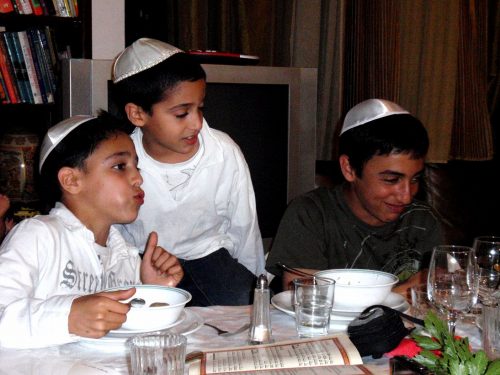Like many religions, Judaism defines the family unit as a blessing and a gift from God. Active family life is highly valued by the Jews as they firmly believe that the home is where ethics and values are flourished.
What Does Judaism Say About Man And Woman?
Judaism bases its belief for the man-woman relationship from the Bible, where it says:
A man shall leave his mother and father and cleave to his wife, and they will become one flesh. (Genesis 2:24)

Generally speaking, the Jews believe that the man and woman are each other’s half, forming a whole. From here, marriage will occur, and new lives will be created. Furthermore, marriage forms the family and the home that flourishes people to become significant members of society.
On the other hand, Judaism believes that both wife and husband have separate responsibilities but view them equally regardless of nature. Both parents can work outside of the house and in the public sphere of life. Both may also take domestic work.
How Do The Jews Raise Their Children?
It is believed that parents are God’s partners in creation. In a Jewish family, disrespecting parents equates to disrespecting God. While parents are expected to nourish their children physically, mentally, emotionally and spiritually, children are then supposed to care for their parents when they grow old.
“Respect is so important because, without it, children can’t value themselves or others. Children who don’t respect themselves are more likely to drink alcohol, take drugs, have sex, and treat others badly. Children who lack self-respect simply don’t care about themselves or anyone else,” Jim Taylor Ph.D. explains.
Jewish parents start to educate their children at home where Judaism traditions are religiously followed. It is a common practice that a child as young as three years old will be taught the Shema, a prominent Jewish prayer that expresses love and faith in God. Jewish families also set aside funds for their children’s secular and religious education.

Jewish parents instill religious beliefs and Jewish morals to their children even at a very young age. Below are some of the values that can be found in Jewish texts:
- Tefillah(Prayer)
- Tzedakah (Righteousness)
- Teshuva (Repentance)
- Tikkun Olam (Repairing The World)
- Ten Commandments
What Are The Traditions Commonly Celebrated By Jewish Families?
Shabbat is widely celebrated among Jewish families and their whole community. In fact, Jewish law forbids the Jews from doing work, travel, and any commercial transaction. This is celebrated in commemoration of God taking rest on the seventh day after His work of creation.
Shabbat begins on Friday,and everyone is expected to be home before the sun sets on that day. The family will then share a feast at the dinner table. Children, with their parents, are also expected to participate in Shabbat services in the community such as prayer and worship services.

Another traditional festival that Jewish family celebrates religiously is the Passover which commemorates the freedom of ancient Jewish people from slavery. Jewish family spends the holiday cleaning their houses, enjoying a festive meal and telling of stories about how God saved them from slavery. Christopher Peterson Ph.D. wrote that, “Shared meals provide an excellent opportunity for good parenting—i.e., spending quality time and quantity time with one’s children.”
The home and family life has been of great importance to the life of the Jewish people. With a family as the center of its teachings and practices, Judaism also highlights the importance of parent-child relationship in instilling values and respect for each other. Even with the ever-changing structure of a modern family, Judaism family traditions and ethics continue to thrive inside the Jewish homes. “Parental warmth and control, in a positive way, are the two most important parental attributes that help to create positive effects,” Neil Farber M.D, Ph.D., CLC, CPT says.